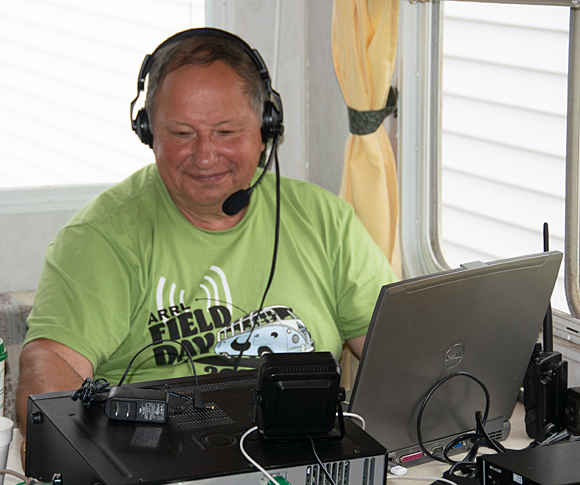Local ham radio operators hold Field Day
DAVE MOSIER/independent editor
Things were a bit different this year, but the Van Wert Amateur Radio Club (VWARC) still held its annual Field Day this past weekend.
Amateur radio operators from the area took part in the annual event that allows “ham” operators to practice skills especially needed during emergency situations, such as tornados and other situations where other forms of communication — microwave towers, etc. — are either down or not functioning.

“This is basically an emergency preparedness exercise,” said VWARC President Jack Snyder, noting that the club not only sets up temporary radio towers from which to transmit, but also runs equipment on generators to simulate what could happen if power was out over a wide area, but maintaining communication was essential.
While the generators and temporary towers are not needed for many Radio Club service requests, which include providing communications for the Van Wert County Fair and other local events, Snyder did say there have been times when the towers and generators have been used.
“Yes, in a very extensive emergency this is what we do,” he explained. The Radio Club also provides a secondary source for weather announcements, along with media outlets and the Van Wert County Emergency Management Agency, Snyder added.
“A lot of people listen to our frequencies and the EMA frequencies to hear what’s happening,” he said.
In addition to just providing communications, several Radio Club members act as weather spotters, using their radios to provide up to date information to EMA Director Rick McCoy on what’s happening with possible severe weather systems.
Snyder has said before, though, that ham operators become even more important after a storm or other severe weather event is over — that’s when their ability to provide communications even when an area is without power comes into play.
In addition to practicing emergency preparedness, a Field Day is also a friendly competition between ham operators and clubs to see who can log the most radio contacts in a 24-hour period. Operations begin Friday afternoon at 2 as Radio Club members begin setting up their temporary towers, radio rigs, computer set-ups, and generators.
The actual Field Day begins at 2 p.m. Saturday and runs for 24 hours — ending at 2 p.m. Sunday.
Snyder said that, like a lot of events and activities, this year’s Field Day saw some changes aimed at avoiding Covid-19 exposure for those participating. Instead of requiring ham operators to be at an emergency site, this year operators were allowed to transmit and receive from their homes, which several local hams opted to do.
Each radio contact earns a ham points in the competition portion of Field Day. While normal contacts earn a point, digital contacts earn double points, while contacts involving the use of Morse Code also earn a bonus for those who use it.
“Morse Code carries more weight (than regular radio contacts),” Snyder said. “Morse is a skill not all operators have learned.”
However, while practicing the ability to communicate during severe weather events is one purpose of Field Day, it looked for a while as if severe weather could have a negative impact on the local radio club’s emergency site set-up.
“After we set up on Friday afternoon, we heard Rick McCoy announce the possibility of storms that could include 70-mph winds,” Snyder said, noting winds of that severity could have toppled the club’s two temporary towers set up on land owned by the Marsh Foundation adjacent to the local EMA office on Lincoln Highway. “Fortunately, that didn’t happen.”
The Radio Club president said, overall, this year’s event went well, thanks to loyal club members that come out each year to help with the event — some from homes hours away.
That was the case with Jerry Ryan, a former Convoy area resident and ham operator since the 1960s who now lives in Indianapolis, Indiana, but makes the trek up to Van Wert each year for Field Day. Snyder said Ryan drives up Friday to help set up equipment that afternoon, then operates radios from Saturday afternoon until Sunday afternoon, before again helping tear down the temporary site and, finally, driving home again late Sunday afternoon with little (or no) sleep.
Another loyal Field Day worker is Duane “Corky” Poling, a founding Radio Club member who has been a “ham” the longest of any local member. Poling, who first earned his ham license at age 14 in the early Fifties, says he has slowed up a bit since his younger days, but still enjoys amateur radio and Field Days.
Snyder, a former radio disc jockey and news announcer in the 1970s, also has been a ham operator for more than four decades.
POSTED: 06/29/20 at 12:47 am. FILED UNDER: News







